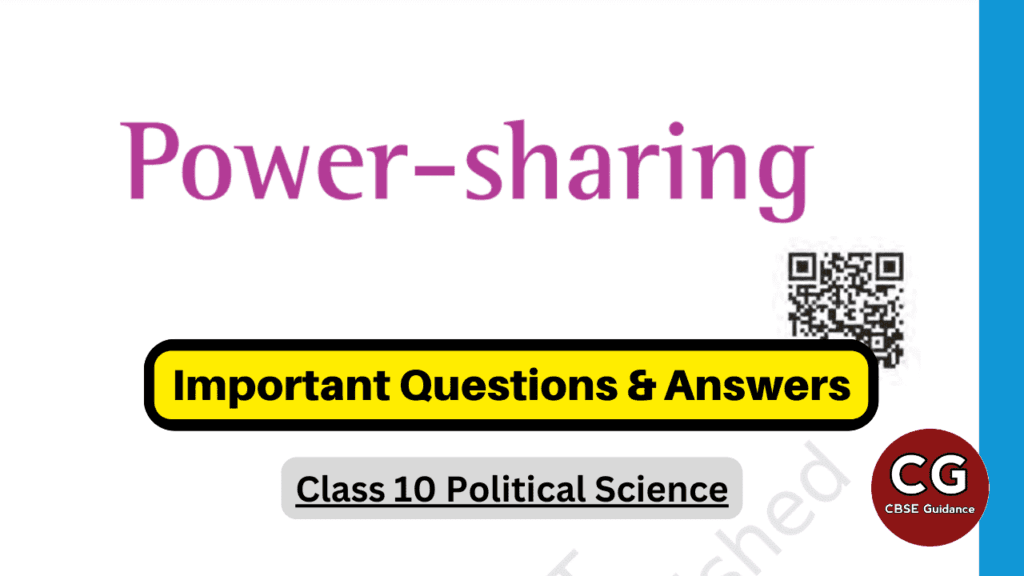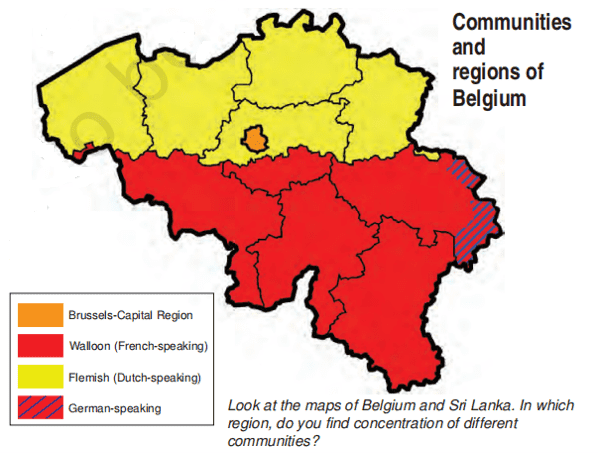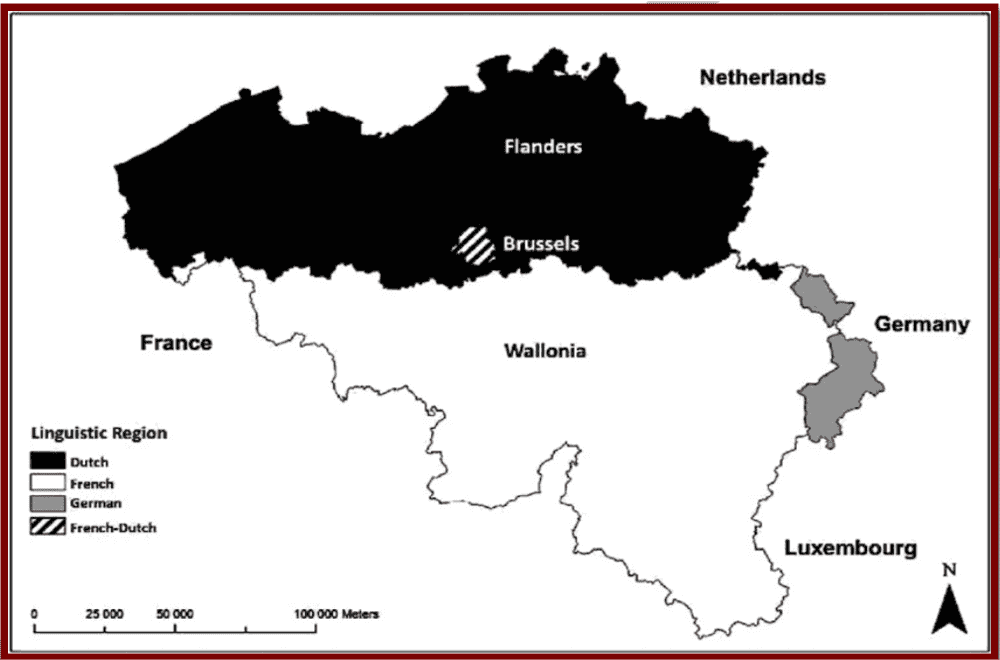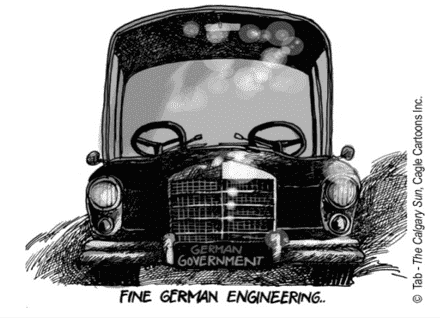Get the most important questions and answers from Class 10 Social Science (SST) Political Science Chapter 1 Power Sharing. These important and extra questions are compiled by CBSE Guidance from various sources like CBSE Official Sample Papers, CBSE PYQs, NCERT textbooks, etc. Students must prepare these questions before appearing in their CBSE class 10 board exam.

| Subject | Social Science (Political Science) |
| Class | 10 |
| Board | CBSE and State boards |
| Chapter No. | 1 |
| Chapter Name | Power Sharing |
| Type | Important Questions & Answers |
| Session | 2024-25 |
| Weightage | 2 Marks |
Happiness is not by chance, but by choice.
- Jim Rohn
Power Sharing Class 10 Important Questions and Answers
Q. No. 1) Multiple Choice Questions (MCQs)
i. Belgium is a small country in Europe and shares borders with France, _________, Germany, and Luxembourg.
a. Italy
b. Sweden
c. the Netherlands
d. Spain
Ans. Option (c).
ii. In Sri Lanka, an Act was passed in _______ to recognize _______ as the only official language, disregarding _________.
a. 1948, Tamil, Sinhala
b. 1956, Sinhala, Tamil
c. 1948, Sinhala, Tamil
d. 1956, Tamil, Sinhala
Ans. Option (b).
iii. Population of Sri Lankan Tamils is concentrated in ____________ region of Sri Lanka.
a. North and South
b. North and East
c. East and West
d. South and East
Ans. Option (b).
iv. Choose the correct statement(s) about Belgium:
- The French-speaking community in Belgium was rich and powerful.
- The Dutch language is dominantly spoken in Belgium.
- Brussels is the capital city of Belgium.
- In Belgium, the leaders realized that the unity of the country is possible by respecting the feelings and interests of different countries.
a. 1,2,3
b. 1,3
c. 2,3,4
d. All are correct
Ans. Option (a).
v. Match the following percentage of the population from column A with the social groups in column B:
| Column A (% of the population) | Column B (Social Groups) |
| a. 59 % | i. French speakers |
| b. 74 % | ii. Dutch speakers |
| c. 40 % | iii. Tamil speakers |
| d. 18 % | iv. Sinhala speakers |
A. a-ii, b-iii, c-iv, d-i
B. a-ii, b-iv, c-i, d-iii
C. a-i, b-iv, c-ii, d-iii
D. a-ii, b-iii, c-i, d-iv
Ans. Option (B).
vi. Choose the correct statements:
- The official religion of Sri Lanka is Buddhism
- Sri Lankan Tamil refers to Tamil natives of the country.
- The leaders of Belgium amended their constitution 3 times.
a. 1,2
b. 1,3
c. Only 3
d. 1,2,3
Ans. Option (a).
vii. Match the following keywords from column A with their explanation in column B:
| Column A (Keywords) | Column B (Explanation) |
| a. Ethnic | i. A belief that let the majority community rule a country. |
| b. Civil war | ii. Calculation of gains and losses. |
| c. Prudential | iii. Conflict between opposing groups. |
| d. Majoritarian | iv. Division based on shared culture. |
A. a-iv, b-iii, c-i, d-ii
B. a-i, b-ii, c-iv, d-iii
C. a-iii, b-iv, c-ii, d-i
D. a-iv, b-iii, c-ii, d-i
Ans. Option (D).
viii. Which language is mainly spoken in the Flemish region of Belgium?
a. Dutch language
b. German language
c. Tamil language
d. None of the above
Ans. Option (a)

ix. What is the language spoken by the people residing in the Wallonia region of Belgium?
a. French language
b. Dutch language
c. German language
d. None of the above
Ans. Option (a).
x. Even though Ministers and government officials exercise power, they are responsible to the parliament or state assemblies. Such an arrangement is called
a. System of checks and balances
b. Power sharing with different political parties
c. Power sharing with pressure groups
d. Vertical division of power
Ans. Option (a).
xi. Which of the following statements accurately distinguishes between Majoritarianism and Power sharing?
a. Majoritarianism emphasizes the dominance of the majority community, while Power sharing emphasizes the sharing of power among different groups.
b. Majoritarianism emphasizes the need for consensus building, while Power sharing emphasizes the exclusion of minority groups.
c. Majoritarianism emphasizes the importance of accommodating minority interests, while Power sharing emphasizes the need for majority rule.
d. Majoritarianism emphasizes the need for peaceful resolution of conflicts, while Power sharing emphasizes the use of force to impose the majority's will.
Ans. Option (a)
xii. Although the French were in a majority in Brussels, they gave equal representation to the Dutch in government because:
a. The Dutch were relatively rich and powerful in Belgium
b. The Dutch were the natives of Belgium
c. The French were given equal representation in the Central government
d. None of the above
Ans. Option (c).
xiii. Learning from Belgium’s experience, which of the following steps could have MOST LIKELY avoided a civil war in Sri Lanka that ended in 2009?
a. Making reservations in jobs for the Tamil-speaking minority community
b. Dividing the entire country on the basis of linguistic lines to appease the citizens
c. Devising laws to accommodate the ethnic differences of citizens to ensure peace
d. Conducting a thorough census to strictly segregate the Indian Tamils from the Sri Lankan Tamils
Ans. Option (c)
xiv. Match List I (forms of power sharing) with List II (forms of government) and select the correct answer using the codes given below in the lists:
| List I | List II |
| 1. Power is shared among different organs of government. | A. Community government. |
| 2. Power is shared among governments at different levels. | B. Separation of powers. |
| 3. Power shared by different social groups. | C. Coalition government. |
| 4. Power shared by two or more political parties. | D. Federal government. |
| 1 | 2 | 3 | 4 | |
| (a) | D | A | B | C |
| (b) | B | C | D | A |
| (c) | B | D | A | C |
| (d) | C | D | A | B |
Ans. Option (c).
Q. No. 2) Fill in the blank: __________ was chosen by the European Union as its headquarters.
Ans. Brussels.
Q. No. 3) How many people speak French and Dutch in the capital city of Brussels?
Ans. 80% French and 20% Dutch speaking.
Q. No. 4) Study the map thoroughly and mention the languages that are dominantly spoken in Belgium.

Ans. The languages that are dominantly spoken in Belgium are Dutch and French.
Q. No. 5) What is the ethnic composition of Sri Lanka?
Ans. The Sinhala speakers are 74% and Tamil speakers are 18% and among Tamils, there are two subgroups – Sri Lankan Tamils and Indian Tamils.
Q. No. 6) “Sharing of powers makes a country more powerful and united.” Do you agree with this statement and why?
Or,
“Power sharing is the very spirit of democracy.” Justify this statement with three suitable points.
Or,
How far do you agree with the statement that power sharing is keeping with the “Spirit” of democracy?
Ans. Power sharing keeps up with the ‘Spirit’ of Democracy as:
- Power sharing ensures that all people have a stake in government.
- Power sharing ensures maximum participation. It upholds the concept of people’s rule. It always brings better outcomes in democracy. It ensures that people are consulted on how they are to be governed.
- Power sharing accommodates diverse groups. It helps to reduce the possibility of conflict between social groups.
Q. No. 7) Explain any three consequences of the majoritarian policies adopted by the Sri Lankan government.
Ans. Consequences of majoritarian policies adopted by the Sri Lankan Government:
- Tamils felt the government was not sensitive to the Tamil language and culture.
- Tamils felt discriminated against in jobs and education.
- Tamils felt the government was practicing religious discrimination.
- Relations between Tamils and Sinhalese became strained.
- Several political organizations were formed demanding an independent Tamil Eelam (state) in the northern and eastern parts of Sri Lanka.
- The distrust between the two communities turned into a civil war, in which, thousands of people from both communities were killed.
- It caused a terrible setback to the social, cultural, and economic life of the country.
Q. No. 8) Differentiate between the horizontal and vertical division of powers.
Or,
Describe horizontal and vertical power sharing in modern democracies.
Ans.
| Horizontal Division of Power | Vertical Division of Power |
| 1. Horizontal Division of Power is a power-sharing arrangement in which power is shared among different organs of government such as the executive, legislative, and judiciary. | 1. In the vertical division of power, power is shared among governments at different levels like union, state, and local levels of government i.e., it involves higher and lower levels of government. |
| 2. In the horizontal division of power, different organs of government exercise different powers. | 2. In the vertical division of power, the constitution clearly lays down the power of different levels of government. |
| 3. Horizontal distribution specifies the concept of checks and balances in order to check the exercise of unlimited powers of the organs. | 3. There is no concept of checks and balances because powers are clearly given by the constitution from the higher level to the lower level. |
Q. No. 9) Which three demands of the Sri Lankan Tamil accepted and met, could have settled the ethnic conflict in Sri Lanka for good? Explain.
Ans. Demands of the Tamils:
- Recognition of Tamil as an official language.
- Equal opportunities for Tamils in government jobs and educational institutions.
- Provincial autonomy for Tamil-dominated provinces.
Q. No. 10) What is power sharing? Give reasons why power sharing is desirable.
Or,
What is power sharing? Why power sharing is desirable? Explain by giving prudential and moral reasons.
Ans. When the power does not rest with any one organ of the state rather it is shared among different levels/organs of the government it is called power sharing.
Power sharing is desirable in democracy because:
i. Prudential reasons:
- It helps to reduce the possibility of conflict between social groups.
- Reducing conflict between social groups ensures the stability of political order.
- It promotes the unity of the nation.
ii. Moral reasons:
- Power sharing is the very spirit of democracy. A democratic rule involves sharing power with those affected by its exercise and who have to live with its effect.
- People have a right to be consulted on how they are to be governed.
- Power sharing helps in producing a legitimate government where citizens through participation acquire a stake in the system.
Q. No. 11) Read the passage, observe the image given below, and answer the questions that follow.
The cartoon above refers to the problems of running Germany’s grand coalition government that includes the country’s two major parties, namely the Christian Democratic Union and the Social Democratic Party. The two parties are rivals to each other. They had to form a coalition government because neither of them got a clear majority of seats on their own in the 2005 elections. They take divergent positions on several policy matters but jointly run the government.

a. Which disadvantage of coalition governments is the image highlighting?
b. Why did the rival parties choose to make a coalition despite being rivals?
c. How does a democratic system, at times, cause such a challenge?
Ans. a. A coalition government may not agree on policy decisions that can affect a country’s progress.
b. The government at the center enforces policy decisions that affect the entire country including the people who support each party, thus the rivals preferred to make a coalition.
c. Democracy enables people to vote for their chosen representatives. In the absence of a clear majority, political parties may form a coalition.
Q. No. 12) Bring out any two sharp contrasts between Belgium and Sri Lankan democracies.
Ans. Sri Lanka and Belgium are both democratic countries yet have very diverse social setups. Both countries have adopted very different approaches when it comes to power-sharing.
- Belgium adopted the policy of accommodation of social and ethnic divisions. On the other hand, Sri Lanka also adopted a democratic system but followed majoritarian policies.
- Under the Belgium model of democracy, power was shared among two ethnic groups. Sri Lanka favored the interests of the majority Sinhala community.
- In Belgium, both groups had an equal share in the working of government but in Sri Lanka, the minority community was isolated.
- To maintain political stability and unity, equal representation was provided to both groups. Apart from that, the community government of both ethnic groups also existed at the local level. Sri Lanka, however, had no such arrangement.
- Belgium's constitution was amended four times before arriving at a final draft to prevent civil strife. In Sri Lanka, majoritarianism led to civil war for twenty long years.
Q. No. 13) What are the advantages of horizontal power-sharing? Explain with an example.
Ans. The advantages of horizontal power-sharing are:
- The power is shared among different organs of government equally.
- Horizontal power-sharing places all the organs of the government i.e., legislature, executive, and judiciary at the same level.
- Under this kind of power-sharing no organ can exercise unlimited powers.
- That is why this system is also known as the system of checks and balances.
- Example: in India, though the ministers and government officials exercise power, they are responsible to the parliament or state legislatures. Similarly, although the judges are appointed by the executive they can check the functioning of the executive or laws made by the legislatures.
Q. No. 14) Describe any three majoritarian measures adopted by the Sri Lankan Government to establish Sinhala supremacy.
Or,
Describe any three provisions of the Act which was passed in Sri Lanka in 1956 to establish Sinhala supremacy.
Or,
Why did Sri Lankan Tamils feel alienated?
Ans. Sri Lankan Tamils felt alienated because:
- The government adopted majoritarian measures to establish Sinhala supremacy. In 1956, an Act was passed to recognize Sinhala as the only official language thus disregarding Tamil.
- The government followed preferential politics that favored Sinhala applicants for university positions and government jobs.
- A new Constitution stipulated that the state shall protect and foster Buddhism.
Q. No. 15) Describe the power-sharing arrangement made by Belgium.
Or,
Explain any three elements of the Belgium model of power sharing.
Or,
What changes were done to the constitution of Belgium?
Ans. Some of the elements of the Belgium model are:
- The number of Dutch and French-speaking ministers shall be equal in the central government.
- Some special laws required the support of the majority of members from each linguistic group.
- The state governments are not subordinate to the central government.
- Brussels has a separate government in which both communities have equal representation.
- Apart from the central and state government, there is a third kind of government called ‘community government’. Community government is elected by people belonging to one language community – Dutch, French, and German-speaking.
Q. No. 16) Explain the major forms of power sharing in modern democracies.
Ans. The major forms of power sharing in modern democracies are:
- Power sharing among the different organs of government. (Horizontal power sharing).
- Power sharing among governments at different levels.
- Power sharing among different social groups.
- Power sharing among political parties, pressure groups, and movements.
- In a democracy, we find interest groups such as businessmen, farmers, and industrial workers.
Q. No. 17) Here are some examples of power sharing. Which of the four types of power-sharing do these represent? Who is sharing power with whom?
- The Bombay High Court ordered the Maharashtra state government to immediately take action and improve living conditions for the 2,000-odd children at seven children’s homes in Mumbai.
- The government of Ontario state in Canada has agreed to a land claim settlement with the aboriginal community. The Minister responsible for Native Affairs announced that the government will work with aboriginal people in a spirit of mutual respect and cooperation.
- Russia’s two influential political parties, the Union of Right Forces and the Liberal Yabloko Movement agreed to unite their organizations into a strong right-wing coalition. They propose to have a common list of candidates in the next parliamentary elections.
- The finance ministers of various states in Nigeria got together and demanded that the federal government declare its sources of income. They also wanted to know the formula by which the revenue is distributed to various state governments.
Ans.
- Here is horizontal power sharing between different organs of the government placed at the same level – the Judiciary and the State legislative assembly in this case.
- Here power is shared among different social and ethnic groups.
- This power-sharing arrangement is between 2 political parties. If the alliance is elected, they form a coalition government and share power.
- This is the vertical form of power sharing. Power is shared between the union government and the state.
| Also, Take a Look at Power Sharing Class 10 Notes |
| You Might Also Like: CBSE Class 10 Notes CBSE Class 10 Important Questions and Answers |
Hope you liked these questions and prepared them all. Please share this with your friends and do comment on your doubts/suggestions in the comment section below.
All lessons of social sci are not in videos and mail also…plz sir update all lessons ….v all need your guidance
Yes sure. Stay connected….
Sir history ke questions answers apload kro sir please
Hi sir
Hi 👋 sir I am not able to join the meeting today at my new account for women in my all time 😞😞 I am not feeling good and I have been able to do it ☺️ I am waiting for your response and I will call you tomorrow ❤️ May God full fill ur all dreams of you 💕 thanku
Sir please get case based and competency q’s of eco and pol sci asap
Sir please get case based and competency q’s of eco and pol sci asap
Sir please explain the last question
very helpful 👌
very usefull